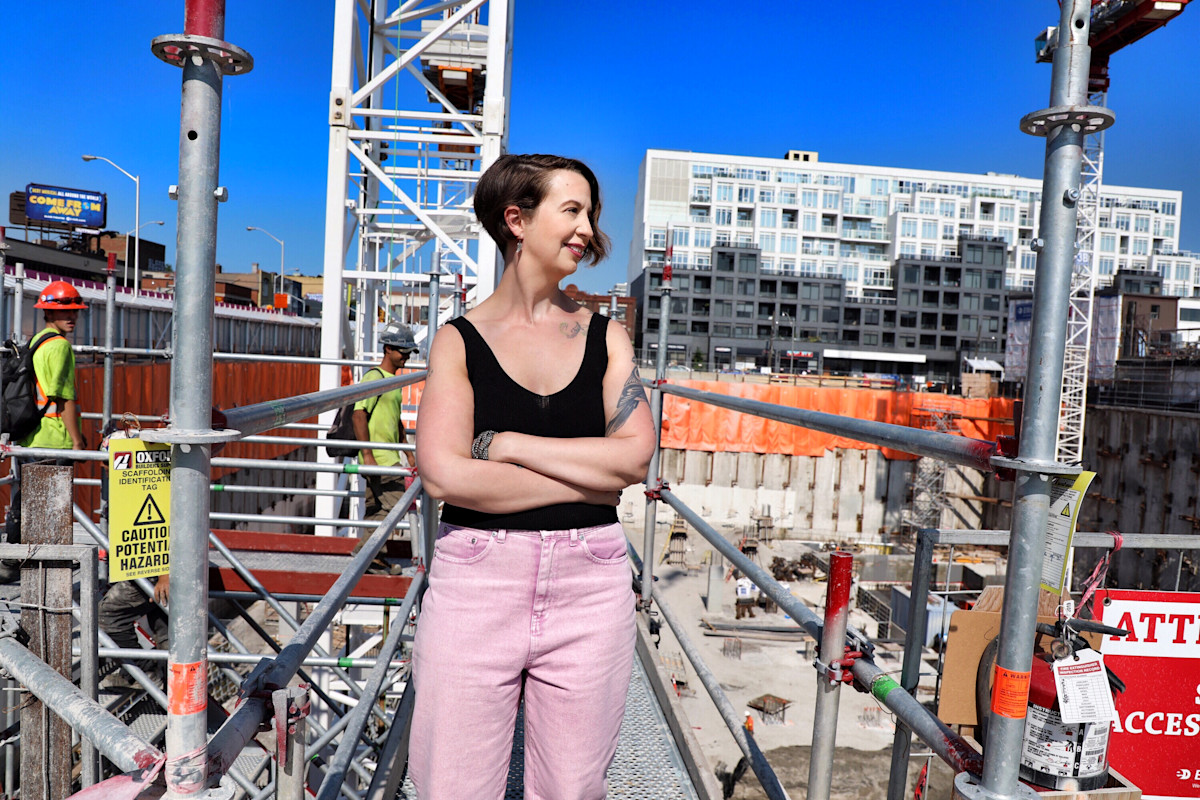Hybrid event: access the livestream here.
Our cities, including stations and mobility concepts, are mainly designed by and for men. Little consideration is given to people with disabilities and women, whether in their role as mothers, workers, or carers. Women often feel unsafe and avoid certain routes, times, and modes of transport. What should a more inclusive city and urban mobility look like?
The Canadian geographer, Leslie Kern, will give a lecture on intersectionality and mobility. In her book Feminist City, Claiming Space in a Man-made world, Kern explains from an historical perspective and personal experience that social inequalities are built into our cities: in the design of mobility, neighbourhoods, and buildings. Kern argues that a feminist city is not only defined and designed by women. It is a city where differences in gender, origin and physical limitations do not (or no longer) create inequality and where all users feel safe, seen, understood, and recognized.
After her lecture, moderator Jana Kerremans will talk to Leslie Kern, architect Apolline Vranken, urban planner Eva Kail and critic and curator René Boer (Failed Architecture platform). During the discussion, we will zoom in on urban projects that serve as examples and take a critical look at European cities such as Brussels, Vienna, and Amsterdam.
Practical information
Leslie Kern and Eva Kail will participate via a video call. This event is sold out, get on the waiting list here.
Access the livestream here.
Bios
Leslie Kern is an associate professor of geography and environment and director of women’s and gender studies at Mount Allison University, in Sackville, New Brunswick, Canada. She is the author of two books on gender and cities, including Feminist City:
Claiming Space in a Man-Made World. Kern’s research has earned a Fulbright Visiting Scholar Award, a National Housing Studies Achievement Award, and several national multi-year grants. She is also an award-winning teacher. Kern’s writing has appeared in The Guardian, Vox, Bloomberg CityLab, LitHub, and Refinery29. She is also an academic career coach, where she helps academics find meaning and joy in their work. Kern’s next book is Gentrification Is Inevitable and Other Lies, forthcoming in September 2022.
Apolline Vranken studied architecture at the Université Libre de Bruxelles (ULB). In 2014 she got became involved in the Feminist Circle of the ULB. During her studies she was passionate about issues of urban equality. She investigates these subjects in her master thesis From beguinages to feminist architecture, published by the University of Women in 2018. She graduated in architecture in 2017. From 2018 till to 2021 she worked as a project manager for the non-profit organization L'Ilot and as an architect. In 2018 she founded the platform L'architecture qui dégenre, to create awareness for of the position of women and minorities in architecture, public space and art. With this platform she initiated the first Belgian Matrimony Days. Today, she is a FNRS PhD student at the Faculty of Architecture (ULB).
Eva Kail is one of the leading experts for Gender Planning in Europe. She works in the Competence Centre Overall Urban Planning, Smart City Strategy, Participation and Gender Planning of the City of Vienna. As an urban planner in the Executive Group for Construction and Technology, she coordinated about sixty pilot projects in the fields of housing, mobility, public space, urban development, and social infrastructure.
René Boer works as a critic, curator, and organizer in and beyond the fields of architecture, art, designdesign, and heritage. He is based between Amsterdam and Cairo and is a driving force behind the Failed Architecture platform. In recent years he has developed a wide array of exhibitions, public programmes, and research projects, often with a focus on spatial justice, urban imaginations, and queer tactics. His current projects include Contemporary Commoning, an experimental exploration of the relation between art and (urban) commons; Terraforming Indonesia, a programme investigating and reimagining large-scale land reclamations in collaboration with the ruangruapa collective; and Smooth
City, a forthcoming publication on the obsession with perfection in cities worldwide.
Jana Kerremans works as an independent host and moderator. Her background as a culture expert and previous work experiences in cultural participatory and cultural tourism projects, and as a business manager for non-profit organizations and museums, provide her with a valuable network, experience, and knowledge. Her areas of expertise are literature, museology, social history, sustainable tourism, urbanism, feminism and gender.
